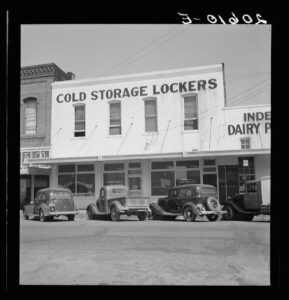 Do not touch me [lit., Stop clinging to me], because I have not yet ascended to the Father. But go to my brothers and say to them, “I am ascending to my Father and your Father, to my God and your God.” (John 20:17).
Do not touch me [lit., Stop clinging to me], because I have not yet ascended to the Father. But go to my brothers and say to them, “I am ascending to my Father and your Father, to my God and your God.” (John 20:17).
Christ’s Body[1] is not where we expect. We imagine finding it in a secure, temperature-controlled environment.
Yes, we know its best days are in the past. We don’t hope for any more great wonders. But we suppose we might at least slow the rate at which what’s left crumbles away.
And yet.
We come to where we expect to find Christ, and what we’re looking for isn’t there at all. We discover, like Mary, that Christ’s Body has become far greater than anything we anticipated.
And then, just when we think we have a grip on things, Christ undoes us again.
 Mary thought she knew what to expect. But in a few short days, Jesus was gone — forever, as far as she knew.
Mary thought she knew what to expect. But in a few short days, Jesus was gone — forever, as far as she knew.
So you can imagine her reaction when she suddenly realized that the one she had given up for dead was back. I’d grab hold and not let go, wouldn’t you?
But she wasn’t clinging merely to her risen Lord. She was holding onto the ways things had been before.
You can hear that in her address: “Rabbi!” Back to the long walks. Healing lepers. Teaching the people. He’ll be right in front, and she’ll be by his side. Just like before.
But Jesus says no. That part of the salvation story to which Mary clung — that was over. New and greater things must happen.
We can hardly blame her. It’s natural for us, upon a loved one’s return, to want them to stay. An Amy Grant song from decades ago captures this longing:
Stay for a while.
It’s so good to see your smile,
And I love your company.
Stay for a while,
And remember the days gone by.
For a moment it can seem
Just the way it used to be.
And if it’s true in our natural relationships, even more in our life-changing relationships with Christ. They began with some particular manifestation of Christ’s Body.
Whether it was summer camp, or an organ prelude, or the Four Spiritual Laws, the transforming moment didn’t happen generally. Some certain form, some specific expression, captured us, and we found new life and hope. We want the feeling behind that expression to remain.
How often do we hold on to what was, hoping things will return to how they once were? And when we do, can we hear Christ’s voice telling us to let go, so that the Body might become what it needs to be?
As the world around us heaves once again in revolution, we cannot keep fixed in place the way we first encountered Christ’s Body. Because that “way” is not the Way. It is not Christ himself. Those forms, those particulars, are moments he used — there and then — to grab hold of our lives and bring us into relationship with him.
 In this world, where forms and expressions grow obsolete and give way to new ones, the Body of the Living One keeps in motion. Just as Jesus refused, so does the Church refuse to stay in a vault — well-stored, not decaying as quickly perhaps, but neither active and at work.
In this world, where forms and expressions grow obsolete and give way to new ones, the Body of the Living One keeps in motion. Just as Jesus refused, so does the Church refuse to stay in a vault — well-stored, not decaying as quickly perhaps, but neither active and at work.
Instead, Christ’s Body breaks forth, moving from one expression of salvation to the next. Christ goes ahead of us, paving the Way from the old life to the new.
And as we follow him into that new life, he gives us a new charge. He commands us, like Mary, to go and tell. The apostolic work goes on. As another songwriter, Austin Miles put it a few decades before Amy Grant:
I’d stay in the garden with him,
Though the night around me be falling.
But he bids me go;
Through the voice of woe,
His voice to me is calling.
A blessed Eastertide to you.
Somewhere along the Way—
Forrest
[1] Yes. The double meaning is intentional.
